International Women’s Day 2019
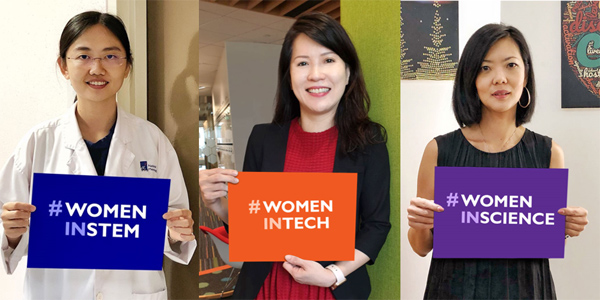
“Don’t be afraid of competition.”
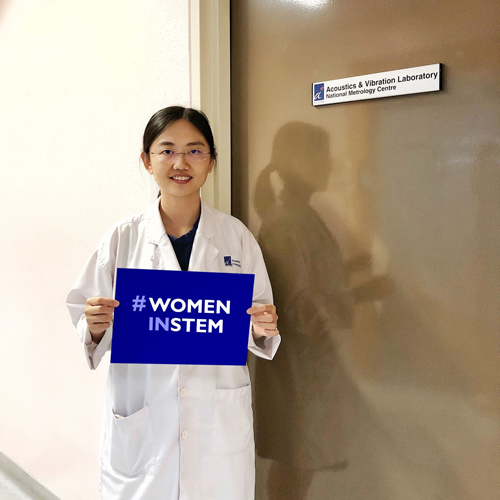
Dr Cui Shan- National Metrology Centre (NMC)- A*STAR
1) Tell us about what you do at A*STAR.Metrology is the scientific study of measurements. At NMC- we conduct R&D to establish and standardise measurement standards- which have wide-ranging impact on our daily lives.
I work in the acoustics and vibration laboratory at NMC- where I support acoustic or sound measurement and its applications in various domains.
One example is using acoustic signatures to detect and locate gas pipeline leakage in a timely manner. Through this- we aim to enhance pipeline operation safety and cut down emergency response time.
Another example is our work with other government agencies to support public hospitals in providing reliable and accurate noise level monitoring in hospital wards. This ensures that the wards are comfortable and conducive for patients to rest and heal.
It is also crucial to ensure accurate and reliable measurement in ground vibration monitoring- especially during construction piling works. We support the relevant government agencies to evaluate the impact of construction works to the current construction site or nearby buildings.
2) What are your motivations for getting into this field of research?
To be honest- I had the same misconceptions as many people when I first heard about the National Metrology Centre. Metrology is not the same as meteorology; it has nothing to do with weather forecasts!
I was motivated to join NMC after learning about the important work they do in industry and scientific research. There is a lot of effort that goes on behind-the-scenes to ensure that our numbers and measurement standards are reliable on the international level.
A lot of Nobel prizes have been given to metrology-related research. This shows metrology’s strong contribution to the advancement of science and engineering. One recent example is the Nobel Prize in Physics 2017 awarded to the LIGO detector and the observation of gravitational waves- which is fundamentally a very accurate vibration displacement measurement.
3) What does being a woman in science today mean to you?
I think women do carry with them different perspectives when it comes to science. From the perspective of a mother- I am passionate about how science impacts the health and wellbeing of women and the next generation. Measurements like that of medical ultrasound power and air quality are significant to research that impacts the population at large.
For air quality measurement- specifically indoor air quality (IAQ)- we look at smart building technology that can help monitor and maintain a good IAQ with efficient energy consumption at home- schools- and offices. I believe there is a level of compassion that we bring to our work.
4) What do you have to say to young girls who want to pursue a career in science?
Don’t be afraid of competition- especially in fields that are generally male-dominated. My background is in electrical and electronic engineering (EEE)- and I don’t feel that the girls are at a disadvantage even though they are outnumbered by the guys. We have our unique points-of-view.
I also did not let the male-dominated EEE field deter me from studying what I’m interested in. I was focusing in the area of wireless communications- and was fascinated by how we are able to connect with one another even though there are no physical things between us.
The signal processing techniques that I learnt in wireless communication can be applied to what I’m doing in metrology to enhance measurement accuracy. There’s a world of opportunities to apply our skills and knowledge even in fields that may not be so obvious from the outset.
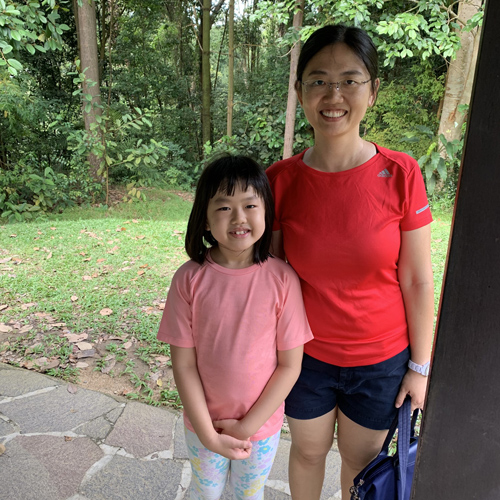
5) What are your favourite pastimes outside of work?
I love spending time with my family. My 8yearold daughter is interested in biological science and I enjoy taking her to the science centre to explain to her how things work. We also have pretty active weekends where we go on hiking trips and exercise together as a family. I believe that we need to be near nature in order to better understand our surroundings.
"I want to make a difference in people’s lives.”
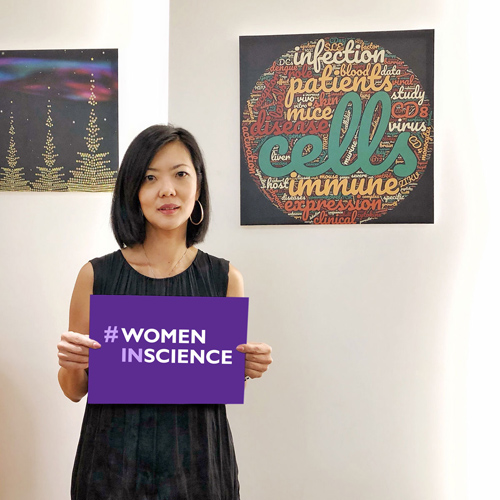
Prof Lisa Ng- Singapore Immunology Network- A*STAR
1) Tell us about what you do at A*STAR.My research is on immunology of infectious diseases—with a keen interest in vector-borne pathogens such as chikungunya and Zika—and how patients respond to them. An intricate understanding of the immune response to infectious diseases enables researchers to develop novel immune-based therapies.
I collaborate widely with other research institutes and hospitals to fully understand all facets of the diseases. Besides- infectious diseases know no borders. My work often takes me outside of Singapore- and that’s where I become both the expert and also the student as I need to reach out to rediscover and redefine what I do in A*STAR and SIgN.
Within A*STAR- we are very well-placed because of the resources and support we have that enable us to be at the forefront of the translational research we do.
On the national level- there is a high concentration of scientists and research partners (like the academic medical centres and institutes of higher learnings) that facilitate exchange of ideas and help me to answer the scientific questions.
2) What are your motivations for getting into this field of research?
I have always had a keen interest in studying diseases and its impact- even in the days before the Severe Acute Respiratory Syndrome (SARS) outbreak. However- it was when SARS hit that my work at A*STAR took on a whole new perspective.
It made us realise that a country can be wealthy and modern- but once an unknown pathogen (virus- parasite- or bacteria) hits- everyone needs to work together to combat the common problem together.
I was also drawn to how we can make use of new technologies and tools to answer many old questions. I want to make a difference in people’s lives.
I’m also heartened by how A*STAR promotes multidisciplinary research with the establishment of the joint and cross councils. This encourages the engineers and biologists to have joint projects. Although we speak different “languages”- we have to work together to answer a common problem.
With time- our “common language” is getting closer.
3) What does being a woman in science today mean to you?
Despite modernisation- mindsets remained unchanged. I recall an incident when I was invited to give a lecture in a clinical research unit in Vientianne- Laos some years ago and a local host had arranged for an airport pick-up for me at the arrival hall. The driver was holding up a sign with my name on it so I approached him- but he was taken aback by the sight of me. He had said: “You can’t be the doctor. You are not a ‘he’.”
I want to make a difference in the mindsets of the people I meet- and I guess with time- this mindset will change for the better. We need to be aware of this as a society.
4) What do you have to say to young girls who want to pursue a career in science?
If you like science- and feel like you can do good science- then go for it! You should not feel restricted in any sense; don’t let all these fixed mindsets define you or your path. Do not be afraid and have conviction.
Yes- a scientific career does come with its own challenges- but so do many other professions. But if the path is too easy- how do you cherish the success you have? You must possess the passion to succeed.
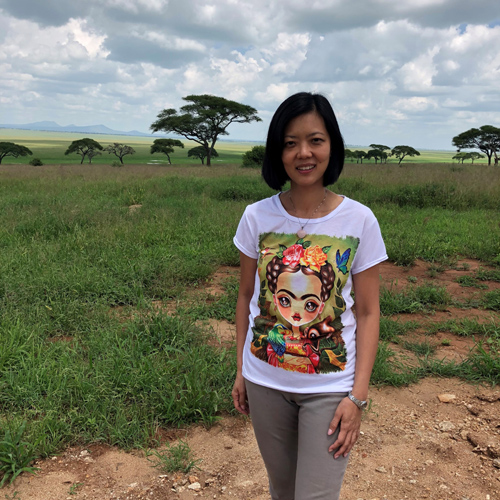
5) What are your favourite pastimes outside of work?
I make a conscious effort to set aside time for myself. I like reading (non-work related books)- traveling- and learning about new cultures. I do yoga and meditation to stay fit and take my mind off stress.
“Providing a shoulder to cry on.”
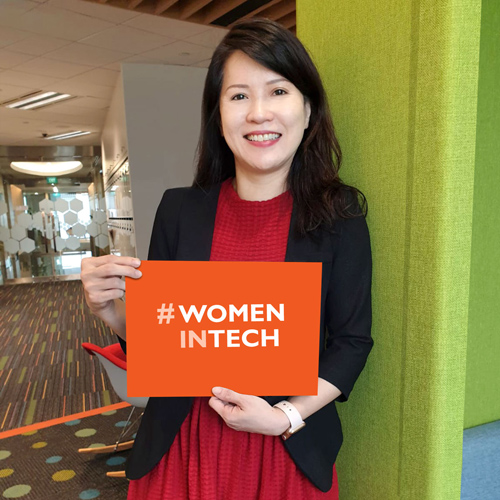
Dr Shen Yiru- A*ccelerate- A*STAR
1) Tell us about what you do at A*STAR.I lead the MedTech team within A*ccelerate to explore and commercialise technologies related to medical devices and digital health initiatives.
My job requires me to work very closely with start-ups- local SMEs and at times with clinicians- to understand clinical needs to be addressed. Through these engagements- our team identifies opportunities where A*STAR’s technologies can help provide innovative solutions to identified problem statements.
Understanding market-driven needs and providing a listening ear (sometimes even a shoulder to cry on) can give insights to translating ideas and technologies to products launched in the market.
2) What are your motivations for getting into this field of research?
The minute I completed my PhD in neuroscience (physiology)- I stepped out into the industry and dived into figuring out how to translate science and technology from “bench to bedside”.
I am passionate about leveraging technologies developed in our laboratories- and transforming them into market-ready end products. It is important to use a productisation perspective when looking at our innovations- so that we can develop it into something useful for industry or consumers.
3) What does being a woman in science today mean to you?
We have too few women in science and tech today. My mom originally wanted me to go into banking and commerce- but I thought that science was far more interesting. Even in school- I always read beyond my science textbooks because I wanted to find out more. I shared this curiosity for science with several of my friends growing up- but ultimately saw them seek alternative employment pathways because it was more ‘realistic’ for women. I always thought it was a shame that not more of us women end up pursuing viable careers in S&T.
I enjoy my job immensely because I do not need to stay in a laboratory to contribute to science and technology. We break boundaries every day. Science is limitless- and I believe in the infinite possibilities it can bring to better our lives.
4) What do you have to say to young girls who want to pursue a career in science?
You define your own success. Do what you are passionate in and ultimately you will succeed.
Even though my education foundation was in science- I did not stay as a researcher but charted my career in MNCs for 12 years to gain experience in both product and sales management.
I would recommend that you always be open to options- and not forget that science and technology can do wonders- especially in improving lives and creating better health outcomes.
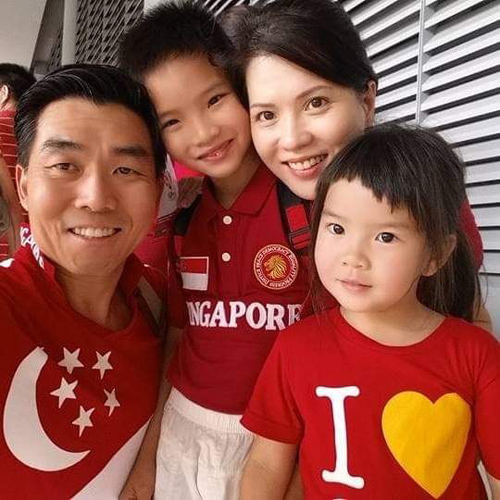
5) What are your favourite pastimes outside of work?
I enjoy creating new recipes and cooking for my family and friends. Cooking takes my stress away and gives me a chance to be creative. I see my time in the kitchen as being akin to doing experiments in a laboratory!
I love spending time with my children as well- who are 7 and 11 years old. I think they share my curiosity for knowledge as they are very inquisitive kids who like to pick my brain on any topic under the sun.
A*STAR celebrates International Women's Day

From groundbreaking discoveries to cutting-edge research, our researchers are empowering the next generation of female science, technology, engineering and mathematics (STEM) leaders.
Get inspired by our #WomeninSTEM
